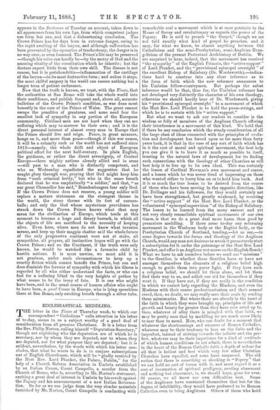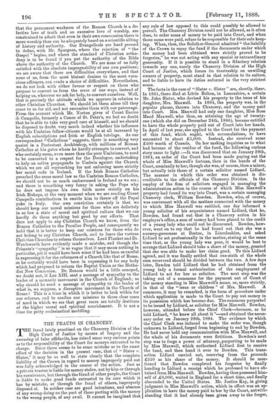ECCLESIASTICAL MEDDLING.
THE letter in the Times of Thursday week, to which our correspondent " Catholicus " calls attention in his letter of to-day, seems to us a subject worthy of a good deal of consideration from all genuine Christians. It is a letter from the Rev. Philip Norton, calling himself "Deputation Secretary," though not explaining who the deputation are of which he is secretary, nor by whom they are deputed, nor to whom they are deputed, nor for what purpose they are deputed ; but it is evident, nevertheless, by the words with which his letter con- cludes, that what he wants to do is to conjure subscriptions out of English Churchmen, which will be "gladly received by the Most Rev. Lord Plunket, the Palace, Dublin," for the help of a Church Reform Association in Umbria established by an Italian Canon, Count Campello, a seceder from the Church of Rome, who is, according to Mr. Norton's statement, exciting a great deal of interest in Umbria by his revolt against the Papacy and his announcement of a new Italian Reforma- tion. So far as we can judge from the very slender materials furnished by Mr. Norton, Count Campello is conducting with
remarkable zeal a movement which is at once patriotic to the House of Savoy and revolutionary as regards the power of the Papacy. He is said to preach "the Gospel," though we are not told exactly what kind of gospel he preaches, and it may, for what we know, be almost anything between Old Catholicism and the semi-Presbyterian, semi-Anglican Evan- gelicism of the present Protestant Archbishop of Dublin. We are surprised to hear, indeed, that the movement has received "the sympathy" of the English Primate, the "active support" of Lord Plunket, and the "provisional episcopal oversight" of the excellent Bishop of Elalisbury (Dr. Wordsworth),—indica- tions hard to construe into any clear inference as to the form of faith which the new reformer announces to his Umbrian fellow-countrymen. But perhaps the safest inference would be that, thus far, the Umbrian reformer has not developed very distinctly the character of his own theology, otherwise we should hardly hear of Dr. Wordsworth giving his "provisional episcopal oversight" to a movement of which the Most Rev. Lord Plunket is to hold the purse-strings, and which he is to sustain with his "active support."
But what we want to ask our readers to consider is the wisdom or folly of members of the Anglican Church offering their interference in a movement of this kind. We hold.that if there be any conclusion which the steady consideration of all the large class of ideas connected with the principles of evolu- tion and development has forced upon us for more than forty years back, it is that in the case of any sort of faith which has in it the root of moral and spiritual movement, the best help you can give it is to leave it as much as possible to itself, trusting to the natural laws of development for its finding such connections with the theology of other Churches as will best help it to live up to its own ideal. This was certainly the lesson of Cardinal Newman's own movement and career, and a lesson which he was never tired of impressing on those who wanted either to hurry him on or to hold him back. And it is as much the true lesson to be derived from the course of those who have been moving in the opposite direction, like Dr. Dollinger and his followers, for they would certainly not have been strengthened, but greatly weakened, by receiving the "active support" of the Most Rev. Lord Plunket, or the volunteered "episcopal supervision "of the Bishop of Salisbury. The lesson to be learned from the many earnest and yet not very clearly reconcilable spiritual movements of our own times, is that we do a great deal more harm than good by premature meddling. If there arose to-day any reforming movement in the Wesleyan body or the Baptist body, or the Presbyterian Church of Scotland, tending,—let us say,—in some degree towards the forms and theology of the Anglican Church, would any man not desirous to wreck it prematurely start a subscription for it under the patronage of the Most Rev. Lord Plunket, and offer it an Anglican wet-nurse on the English Bench? What we have to ask ourselves before we send out " missions " to the Gentiles, is whether these Gentiles have or have not amongst themselves the elements of a religious belief high enough to guide them into purer light. If they have such a religious belief, we should let them alone, and let them find their way to us, and solicit our aid for themselves if they want it. If the have not, if they are really in the condition in which we cannot help regarding the Hindoos, and even the Moslems with their coarse predestinarianism and their sensual creed, then, no doubt, we may really save their souls by sending them missionaries. But where there are already in the heart of the faith in which they were brought up, principles of life and growth and beauty far greater than they have ever acted up to, then, whatever of alloy there is mingled with that faith, we may be pretty sure that by meddling we are much more likely to mar than to mend. Now, who can doubt for a moment that whatever the shortcomings and excesses of Roman Catholics, whatever may be their tendency to lean on the finite and the imperfect, instead of striving towards the infinite and the per- fect, whatever may be their impatience for a kind of certitude of which human conditions do not admit, there is nevertheless in the heart of the Roman Catholic faith a depth of ardour for all that is holiest and best which very few other Christian Churches have equalled, and none have surpassed. The old notion that there is something so shocking in "Popery" that we can hold no sort of terms with it, and must regard it as a sort of incarnation of spiritual profligacy, needing abasement and nothing but abasement, is, we should hope, gone for ever. Of course, we all know our own difficulties best. Some of the Anglicans have convinced themselves that but for the dogma of infallibility, they would have preferred to be Roman Catholics even to being Anglicans. Others of them who hold
that the permanent weakness of the Roman Church is a de- fective love of truth and an excessive love of worship, are
constrained to admit that even in their own communion there is more worship than can be adequately based on a scientific sifting of history and authority. Our Evangelicals are hard pressed to define, with Mr. Spurgeon, where the rejection of "the Gospel" begins, and where the standard of Christian ortho- doxy is to be found if you put the authority of the Bible above the authority of the Church. We are none of us fully satisfied with the absolute impregnability of our own positions; we are aware that there are difficulties everywhere, and that none of us, from the most blatant deniers to the most vora- cious affirmers, can evade a choice of difficulties. Nevertheless, we do not look with either favour or respect on those who propose to convert us from the error of our ways, instead of helping us, wherever we ask for help, to convert ourselves. Well, that is precisely the attitude which we approve in relation to other Christian Churches. We should let them alone till they come to us for aid, and not encumber them with our patronage. From the account which Mr. Norton gives of Count Enrico di Campello, formerly a Canon of St. Peter's, we feel no doubt that he is able to take very good care of himself, and we should be disposed to doubt very much indeed whether his influence with his Umbrian fellow-citizens would be at all increased by English subscriptions and Irish or English tutelage. As our correspondent " Catholicus " suggests, there is something very quaint in a Protestant Archbishop, with millions of Roman Catholics at his gates whom he hardly attempts to convert, and who certainly seem, even more than the poor Umbrians, to need to be converted to a respect for the Decalogue, undertaking to help an active propaganda in Umbria against the Church which we are all reproaching for not enforcing more strictly her moral code in Ireland. If the Irish Roman Catholics preached the same moral law as the Umbrian Roman Catholics, we should not be as much embarrassed in Ireland as we are ; and there is something very funny in asking the Pope why he does not impose his own faith more strictly on his Irish Bishops, at the very moment when we are sending Count Campello contributions to enable him to throw off the Papal yoke in Italy. Our own conviction certainly is that we should keep our moral missions for those who are definitely in so low a state of moral and spiritual culture that we can hardly do them anything but good by our efforts. That does not apply to any Christian Church we know, from the Roman Catholics to the Peculiar People, and consequently we hold that it is better to keep our missions for those who do not belong to any Christian Church, and to leave the various Christian Churches to reform themselves. Lord Plunket and Dr.
Wordsworth have evidently made a mistake, and though the Primate's "sympathy" is so vague that it may mean nothing in particular, yet it would have been wiser if he had been as careful in expressing it for the reformers of a Church like that of Rome, as he certainly would have been in expressing it for any body which had proposed to reform the Baptist Union or the Metho- dist New Connexion. Dr. Benson would be a little annoyed, we doubt not, if Leo XIII. sent a message of sympathy to the leader of a monastic movement in the Church of England ; so why should he send a message of sympathy to the leader of what is, we suppose, a disruptive movement in the Church of Rome ? This is a time in which it is better to look within for our reforms, and to confine our missions to those clear cases of need in which we see that great races are totally destitute of the higher moral and spiritual nourishment. It is not a Lime for petty ecclesiastical meddling.



































 Previous page
Previous page